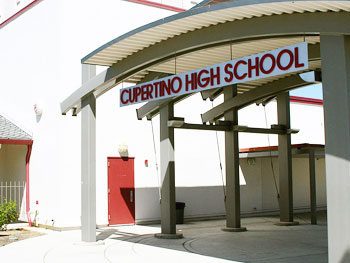When you ignore the wavy red lines on your computer screen, you do so at your own peril. After drafting a document, it’s always a good idea to run through spell-checking. Spell-checking software has a reasonably high IQ, but the “autocorrect” feature can still get you in trouble and make some pretty humorous substitutions. Transposed letters are not corrected when you type Untied States of America because untied is a real word. Princesses may be corrected to primates, snack to snake. Ben Zimmer, a columnist for the Boston Globe, calls this phenomenon the “Cupertino effect.”

Source: Cupertino City Limit, koalie, Wikimedia
The so-called Cupertino effect has been an unfortunate element of spell-checking ever since Microsoft Office 97 couldn’t recognize unhyphenated cooperation and instead replaced it with Cupertino, the name of a California town. You can still manage to find documents online from the EU and other international organizations that have the word Cupertino where cooperation is intended, such as in this NATO document, “The Cupertino with our Italian comrades proved to be very fruitful.”
If you can spell, spell-checkers work reasonably well, but if you can’t, you have trouble akin to the problem of looking up words you can’t spell in the dictionary. If you can’t spell, you can’t type a close enough approximation of the word for the spell-checker to kick into gear.
Another big problem with spell-checkers is that they miss those ubiquitous homophones. Sometimes typos like “except an invitation,” or “crawl threw the window,” or “increased the company’s sails” make it into a final document because except, threw, and sails are valid words. In other words, spell-checkers are lousy at guessing the context of words.
Read the passage below. The spell-checker passed it with flying colors, but you’ll soon see that the passage is saturated with homophones and misspelled words.
They’re know miss steaks in this newsletter cause we used special soft wear witch checks yore spelling. It is mower or lass a weigh too verify. How ever it can knot correct arrows inn punctuation ore usage: an it will not fined words witch are miss used butt spelled rite. Four example; a paragraph could have mini flaws but wood bee past by the spell-checker. And it won’t catch the sentence fragment which you. Their fore, the massage is that proofreading is knot eliminated, it is still berry much reek wired.
I have Microsoft Office installed on my computer and was anxious to see how many mistakes it would detect in this paragraph. My program found the following errors:
- “cause” suggesting “because”
- “how ever” suggesting “however”
- “knot” suggesting “not”
- “fined” suggesting “fine”
- “wont” suggesting “won’t”
How can “software” that can’t identify “soft wear” as an error inspire confidence? If the spell-checker can find less than 15% of the errors in an error-ridden paragraph, it’s certainly not the answer to all your spelling issues. Now you try it.
-
 Open your notes
Open your notes - Select the text in the box above and copy it.
- Paste it into your notes.
Click on the icon that looks like this  to run the Spell Check feature. Did this software find any of the errors in the paragraph? Likely, it didn’t.
to run the Spell Check feature. Did this software find any of the errors in the paragraph? Likely, it didn’t.
 Now, still using your notes, rewrite this paragraph so that it’s correct. When you’re finished, check your understanding to see how another student corrected this paragraph. You may find that you need to add a few words and correct some punctuation, but your primary focus is spelling.
Now, still using your notes, rewrite this paragraph so that it’s correct. When you’re finished, check your understanding to see how another student corrected this paragraph. You may find that you need to add a few words and correct some punctuation, but your primary focus is spelling. Sample Response:
There are no mistakes in this newsletter because we used special software, which checks your spelling. It is more or less a way to verify. However, it cannot correct errors in punctuation or usage, and it will not find words which are misused but spelled right. For example, a paragraph could have many flaws but would be passed by the spell-checker, and it won’t catch the sentence fragment which you wrote. Therefore, the message is that proofreading is not eliminated, but it is still very much required.